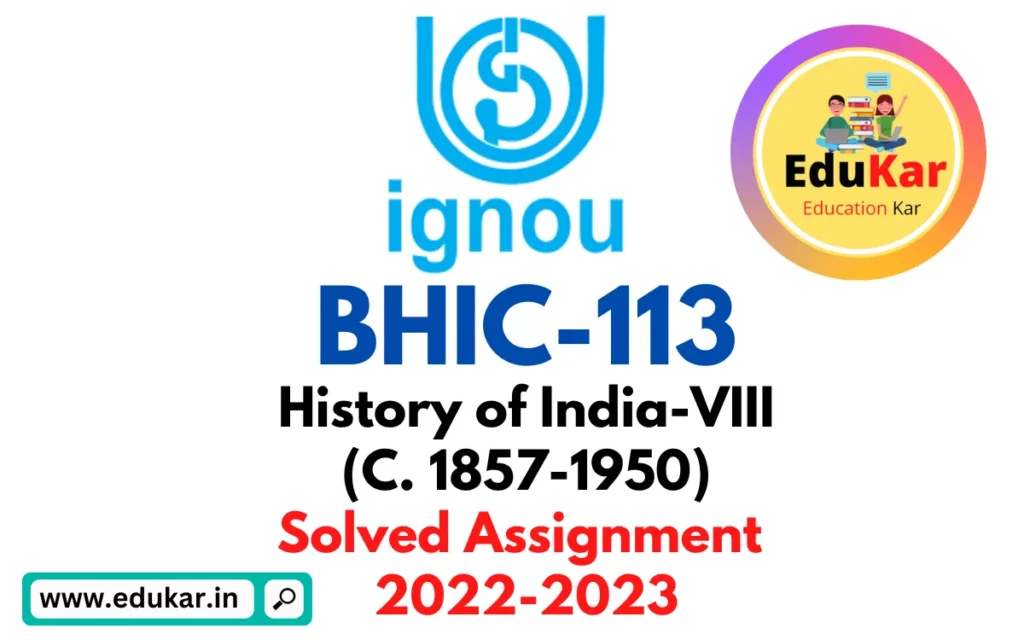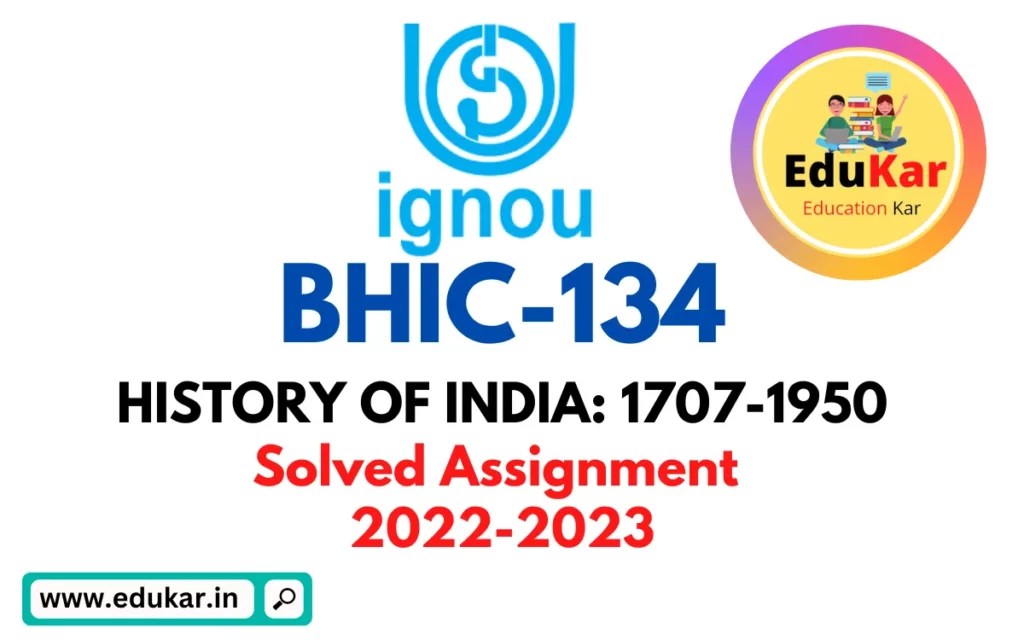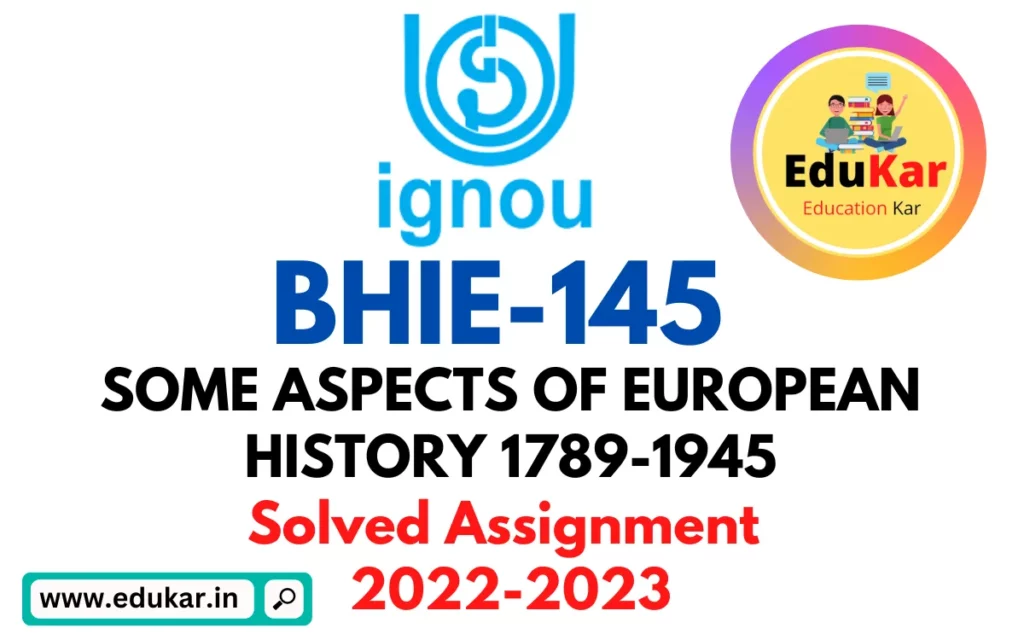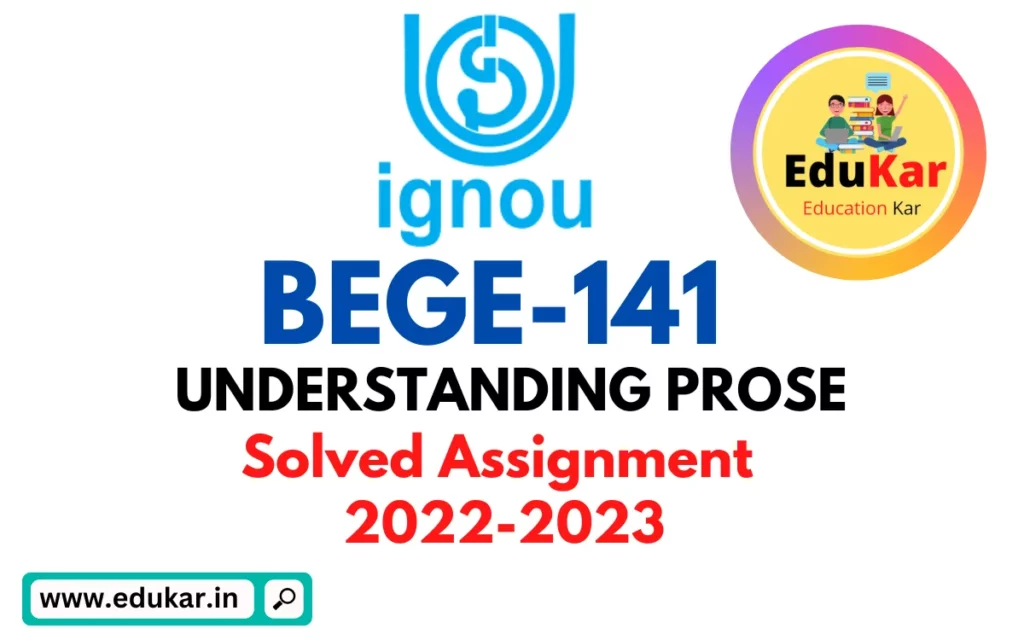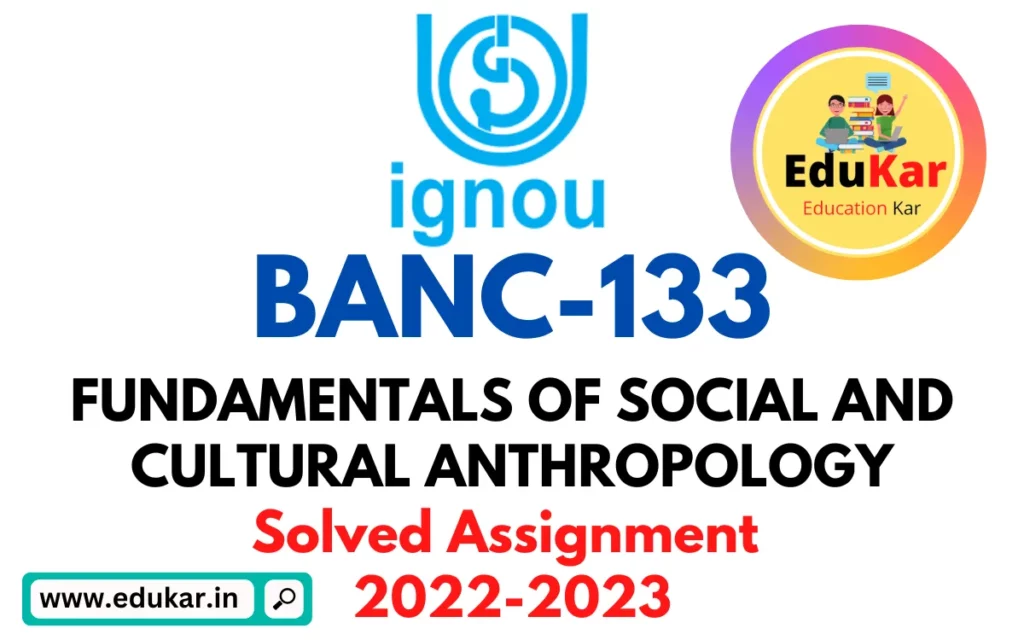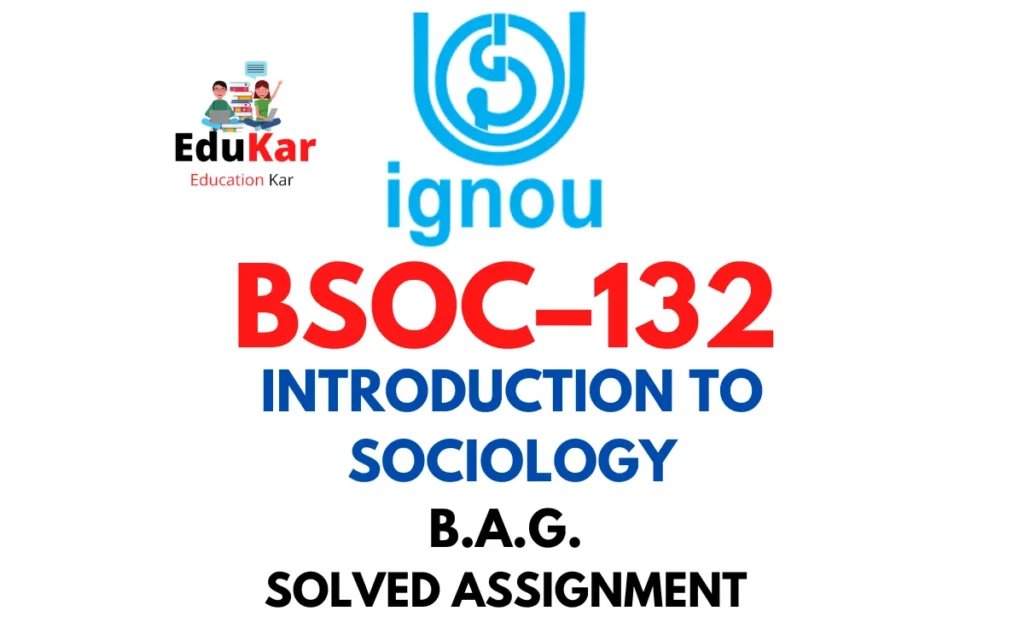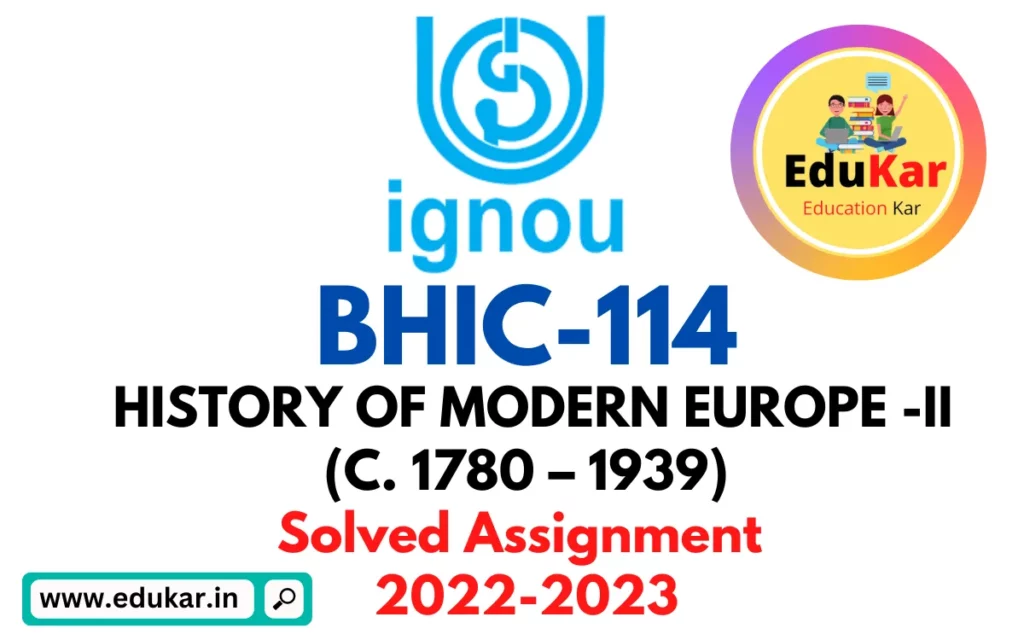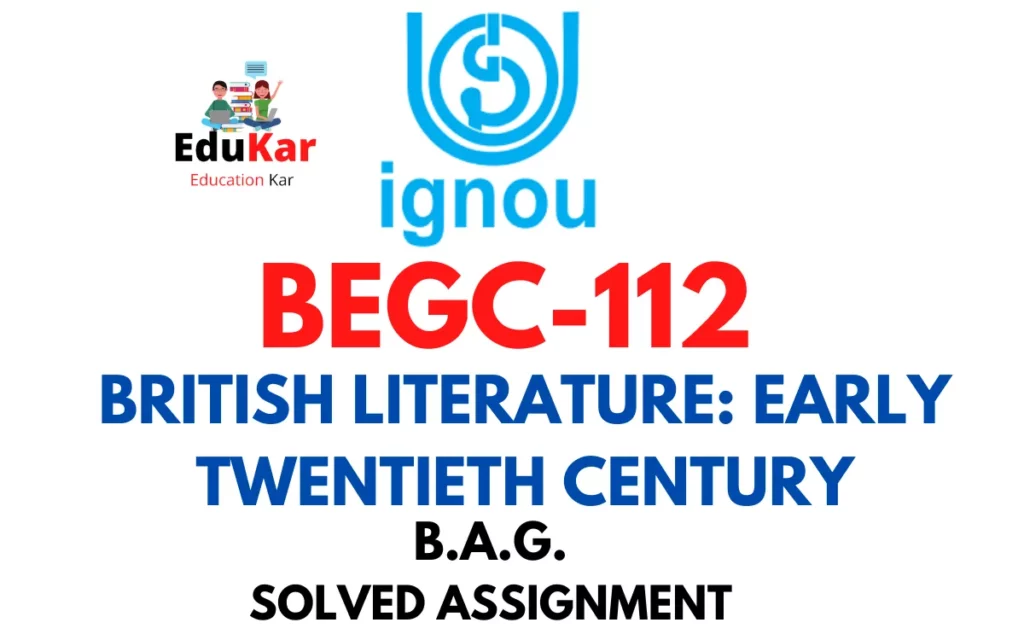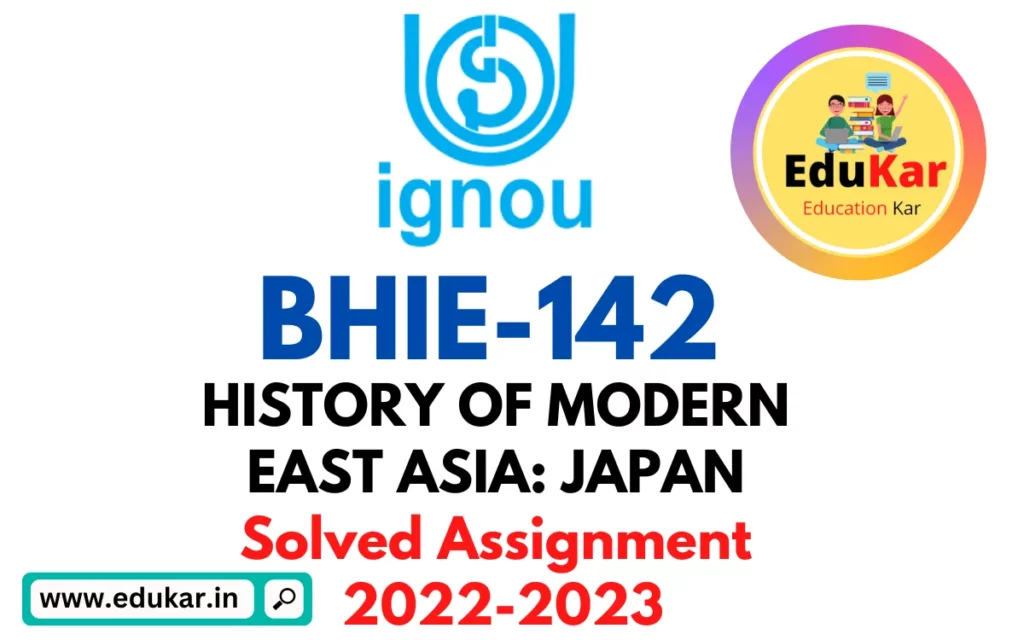Contents
- 1 Assignment-I
- 2 Answer the following in about 500 words each.
- 3 1. Trace the genesis of Modern Indian Political Thought.
- 4 2. Discuss Raja Rammohan Roy’s reformist efforts in education.
- 5 Assignment-II
- 6 Answer the following questions in about 250 words each.
- 7 1. Write a note on Pandita Ramabai’s contribution to feminist thought.
- 8 2. Discuss Swami Vivekananda’s Vies on religion.
- 9 3. Examine Gandhi’s concept of Swaraj.
- 10 Assignment-III
- 11 Answer the following questions in about 100 words each.
- 12 1. Elaborate upon Tagore’s critique of nationalism.
- 13 2. What were Jawaharlal Nehru views on Socialism? Explain.
- 14 3. Write a note on Lohiya’s views on Socialist Democracy.
- 15 4. What did Iqbal have to say about modernity? Elaborate.
- 16 5. Examine Savarkar’s View on Nationalism.
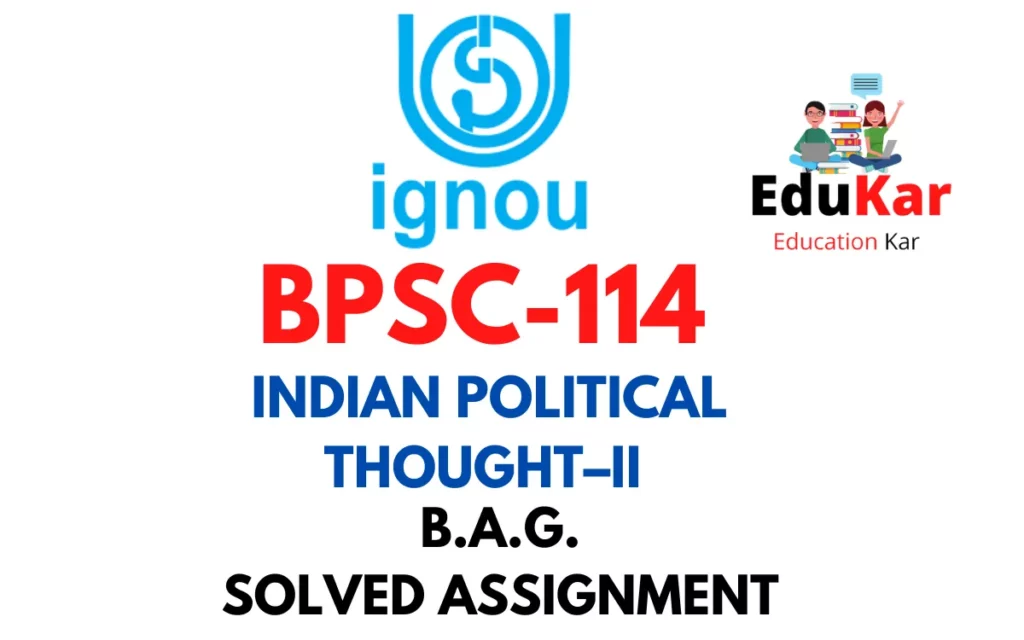
| Title | BPSC-114: IGNOU BAG Solved Assignment 2022-2023 |
| University | IGNOU |
| Degree | Bachelor Degree Programme |
| Course Code | BPSC-114 |
| Course Name | INDIAN POLITICAL THOUGHT–II |
| Programme Name | Bachelor of Arts (General) |
| Programme Code | BAG |
| Total Marks | 100 |
| Year | 2022-2023 |
| Language | English |
| Assignment Code | BPSC-114/ASST/TMA/2022-23 |
| Last Date for Submission of Assignment: | For June Examination: 31st April For December Examination: 30th September |
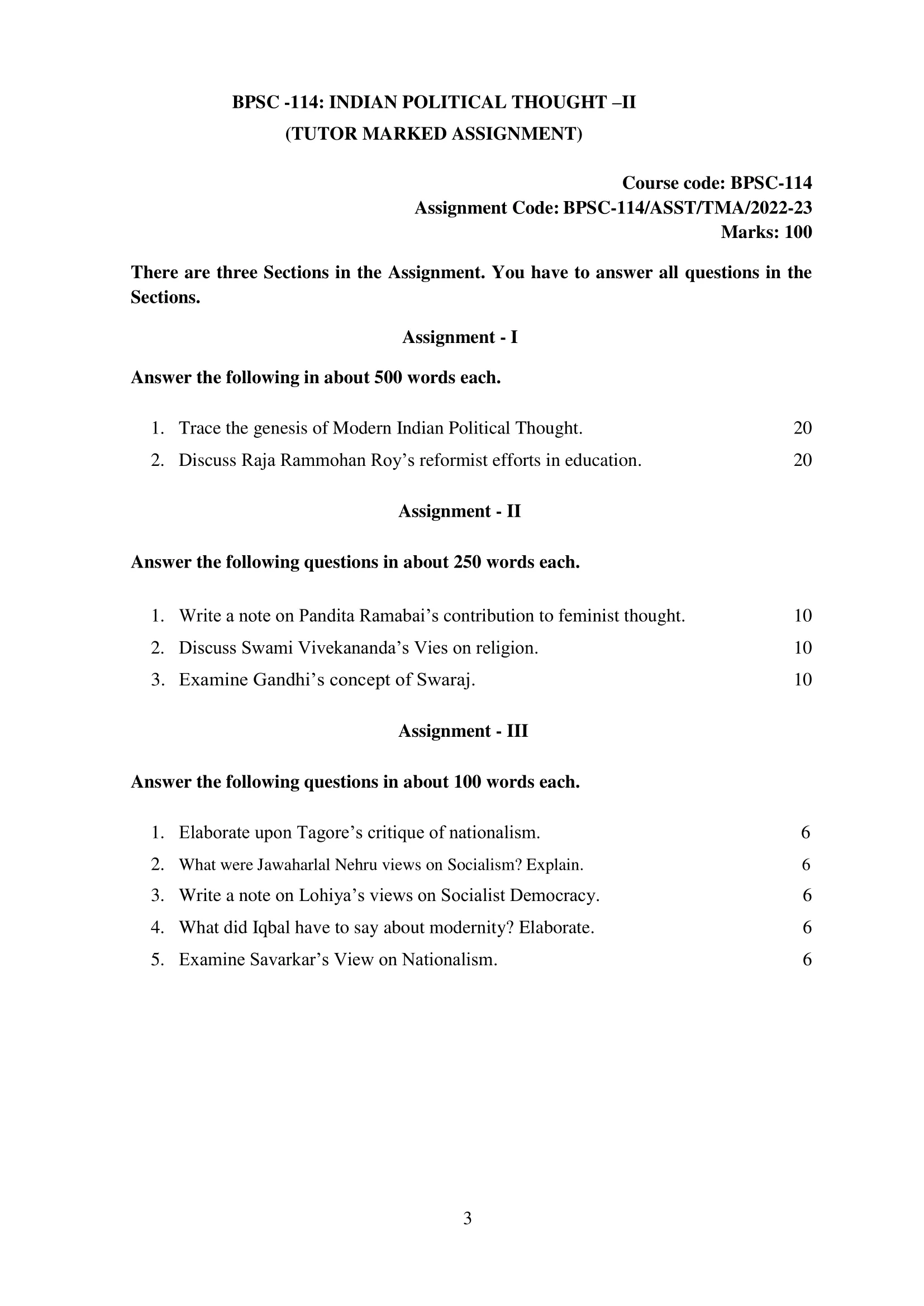
Assignment-I
Answer the following in about 500 words each.
1. Trace the genesis of Modern Indian Political Thought.
Ans: Modern Indian Political Thought emerged in the context of India’s colonial experience and the quest for independence from British rule. The genesis of Modern Indian Political Thought can be traced back to the Indian Renaissance and the Nationalist Movement in the 19th and early 20th centuries.
The Indian Renaissance, which began in the early 19th century, was a period of intellectual and cultural awakening that aimed to reform Indian society and revive the country’s ancient heritage. It was characterized by the rise of a new class of educated Indians who sought to challenge the traditional structures of society and bring about social, cultural, and political reforms.
In the political sphere, the Indian Renaissance paved the way for the emergence of the Nationalist Movement, which aimed to secure India’s freedom from British rule. The Nationalist Movement was led by a number of prominent leaders, including Dadabhai Naoroji, Gopal Krishna Gokhale, Bal Gangadhar Tilak, and Mohandas Karamchand Gandhi.
Dadabhai Naoroji, known as the Grand Old Man of India, was the first Indian to be elected to the British Parliament. He was a staunch advocate of Indian self-rule and argued that British colonialism had impoverished India. He believed that India should have a greater say in the management of its own affairs and that the country’s resources should be used for the benefit of its own people.
Gopal Krishna Gokhale was another prominent leader of the Nationalist Movement. He believed in peaceful and constitutional methods of agitation and advocated for greater representation of Indians in the colonial administration. He also championed the cause of social and economic reform, particularly the eradication of caste-based discrimination.
Bal Gangadhar Tilak was a fiery nationalist who believed in the use of mass mobilization and direct action to achieve independence. He is best known for his slogan “Swaraj is my birthright and I shall have it,” which became a rallying cry for the independence movement. Tilak also stressed the importance of preserving India’s cultural heritage and promoted the use of Indian languages and literature.
Mohandas Karamchand Gandhi, who is often referred to as the Father of the Nation, was the most influential leader of the Indian Nationalist Movement. He developed the concept of satyagraha, or nonviolent resistance, as a means of challenging British rule. He believed in the power of individual conscience and emphasized the importance of moral and spiritual values in politics. Gandhi’s ideas had a profound influence on Indian political thought and continue to shape the country’s political discourse to this day.
In addition to these leaders, there were a number of other important figures in the Nationalist Movement who contributed to the development of Modern Indian Political Thought. These include Jawaharlal Nehru, who became India’s first Prime Minister after independence, B.R. Ambedkar, who championed the cause of Dalit rights, and Subhas Chandra Bose, who led the Indian National Army in the fight against British rule.
The Nationalist Movement succeeded in securing India’s independence in 1947, but it also left behind a rich legacy of political thought and ideas that continue to shape Indian politics and society. The ideas of the Indian Renaissance and the Nationalist Movement laid the foundation for Modern Indian Political Thought, which has continued to evolve and develop in the post-independence era.
2. Discuss Raja Rammohan Roy’s reformist efforts in education.
Ans: Raja Rammohan Roy, often regarded as the “Father of Modern India,” was a social reformer, scholar, and philosopher who played a significant role in the intellectual and cultural transformation of 19th century India. Among his many reformist efforts, his contributions to the field of education were particularly noteworthy.
Roy recognized the crucial role that education played in the social and intellectual development of a nation, and he was deeply concerned with the quality and accessibility of education in colonial India. He believed that education should be the foundation of a society’s progress and that it should be accessible to all, regardless of caste, creed, or gender.
To this end, Roy founded the Hindu College in Calcutta (now Kolkata) in 1817, which was one of the first institutions of higher learning in colonial India. The college was founded on the principles of secularism and rationality, and it aimed to provide a modern, liberal education that would equip students with the skills and knowledge needed to participate in the modern world.
Roy’s educational vision was also informed by his belief in the importance of science and technology, which he saw as essential tools for social and economic progress. He was an early advocate of the study of science in India, and he encouraged the teaching of practical skills such as agriculture and engineering alongside traditional academic disciplines.
In addition to his efforts to promote modern education, Roy was also a vocal critic of traditional forms of education in India, which he saw as backward and oppressive. He was particularly critical of the caste system and the practice of sati (widow burning), which he saw as social evils that were perpetuated by the ignorance and superstition fostered by traditional education.
Roy’s reformist efforts in education were part of a broader vision for social and political reform in India. He was a staunch advocate of social and religious reform, and he worked tirelessly to promote the ideals of rationalism, humanism, and liberal democracy. His contributions to the development of modern India were profound, and his ideas continue to inspire generations of scholars and activists to this day.
Assignment-II
Answer the following questions in about 250 words each.
1. Write a note on Pandita Ramabai’s contribution to feminist thought.
Ans: Pandita Ramabai (1858-1922) was an Indian scholar, social reformer, and women’s rights activist who made significant contributions to feminist thought. Her work was deeply rooted in her experiences as a woman in a patriarchal society, and she challenged traditional gender roles and advocated for the empowerment of women.
One of Ramabai’s most significant contributions to feminist thought was her critique of the Hindu caste system and the position of women within it. She argued that the caste system was a tool of oppression that prevented women from accessing education and other opportunities. Ramabai also called for the abolition of child marriage, which was prevalent in her time and deprived young girls of their childhoods.
Ramabai was also a strong advocate for women’s education, which she saw as a means of empowering women and challenging the patriarchal norms of her society. She founded several schools and an ashram for widows, which provided women with the education and support they needed to become independent and self-sufficient.
Another important aspect of Ramabai’s feminist thought was her emphasis on the spiritual dimension of women’s lives. She believed that women had the potential to achieve spiritual enlightenment, and that this was an important source of empowerment. This idea challenged the prevailing view of women as passive and dependent, and helped to establish a new vision of women’s role in Indian society.
2. Discuss Swami Vivekananda’s Vies on religion.
Ans: Swami Vivekananda (1863-1902) was a prominent Hindu monk and philosopher who played a key role in the development of modern Hinduism and the spread of Vedanta philosophy in the West. His views on religion were deeply rooted in his spiritual experiences and his understanding of the teachings of Hinduism.
One of Vivekananda’s key ideas about religion was the concept of universalism. He believed that all religions were essentially the same at their core, and that they all pointed towards the same ultimate truth. This idea was based on the Hindu concept of unity in diversity, which emphasized the essential oneness of all things despite their apparent diversity.
Another important aspect of Vivekananda’s views on religion was his emphasis on the importance of individual spiritual experience. He believed that true religion was not a matter of blindly following a set of beliefs or practices, but rather of direct experience of the divine. This idea was closely linked to the Hindu concept of yoga, which emphasized the cultivation of inner awareness and the realization of one’s true nature.
Vivekananda also placed a great deal of emphasis on the practical application of religious teachings in everyday life. He believed that religion should not be confined to the realm of the abstract or the theoretical, but should be directly relevant to the challenges and opportunities of the modern world. This idea was reflected in his emphasis on social service and his advocacy for the development of a modern, progressive India that was rooted in the spiritual values of Hinduism.
3. Examine Gandhi’s concept of Swaraj.
Ans: Swaraj, a term popularized by Mahatma Gandhi, refers to the idea of self-rule and self-governance. It is often associated with India’s struggle for independence from British colonial rule, but its meaning goes beyond mere political independence. Instead, Gandhi’s concept of Swaraj was a holistic vision for social, economic, and political transformation that would empower ordinary people and lead to the creation of a just and equitable society.
At its core, Gandhi’s concept of Swaraj was rooted in the idea of individual and collective self-control. He believed that true freedom could only be achieved when people were able to govern themselves, and that this required a radical transformation of the way society was organized. For Gandhi, Swaraj meant not only political independence, but also economic self-sufficiency, the eradication of poverty, the promotion of social justice, and the empowerment of marginalized communities.
Gandhi’s vision of Swaraj was also deeply influenced by his belief in non-violence and his rejection of Western-style industrialization. He saw modern civilization as having lost touch with the natural world and the fundamental values of human life, and argued that Swaraj required a return to a simpler, more sustainable way of life. This involved the promotion of small-scale, decentralized industries and the rejection of the capitalist model of economic development.
Another important aspect of Gandhi’s concept of Swaraj was his emphasis on the role of education in social transformation. He believed that true Swaraj could only be achieved through the cultivation of individual and collective consciousness, and that this required a transformation of the education system. This involved a focus on practical, experiential learning that would empower people to take control of their own lives and contribute to the well-being of their communities.
Assignment-III
Answer the following questions in about 100 words each.
1. Elaborate upon Tagore’s critique of nationalism.
Ans: Rabindranath Tagore, a prominent Indian poet and philosopher, was critical of nationalism and its narrow focus on identity and exclusivity. He saw nationalism as a form of collective egoism that promoted division and conflict rather than unity and cooperation. According to Tagore, nationalism was a dangerous force that could easily be co-opted by political leaders and used to manipulate and control people. He also argued that the emphasis on national identity could lead to the suppression of individual identity and the diversity of human experience. Instead, Tagore emphasized the importance of universalism and humanism, and advocated for a vision of the world that was rooted in the recognition of the essential oneness of all things.
2. What were Jawaharlal Nehru views on Socialism? Explain.
Ans: Jawaharlal Nehru, the first Prime Minister of India, was a strong proponent of socialism and viewed it as a means of achieving social and economic justice for all citizens. Nehru’s vision of socialism was influenced by the socialist and Marxist ideologies he encountered during his time in Europe, but it was also deeply rooted in the Indian context.
According to Nehru, socialism was necessary to overcome the legacy of colonialism and to ensure that the benefits of economic growth were shared equitably across society. He believed that the state had a key role to play in promoting economic development and social welfare, and that this required a strong public sector and the regulation of private enterprise.
Nehru’s vision of socialism also emphasized the importance of democratic governance and the participation of ordinary citizens in decision-making. He believed that the empowerment of the working class and the peasantry was essential to the success of socialism, and that this required the creation of a mass political movement that was rooted in the aspirations and needs of ordinary people.
3. Write a note on Lohiya’s views on Socialist Democracy.
Ans: Ram Manohar Lohia, an Indian socialist thinker and politician, believed in the concept of Socialist Democracy. According to Lohia, the basic principles of democracy, such as the rule of law, freedom of speech and expression, and the right to vote, were necessary but not sufficient to ensure true democracy. He argued that a truly democratic society should also ensure social and economic justice for all its citizens. For Lohia, socialism was the means to achieve this goal, and he believed that a socialist democracy would promote the interests of the working class and marginalized communities. Lohia’s views on socialist democracy remain influential in Indian socialist thought and continue to inspire social and political movements in India and beyond.
4. What did Iqbal have to say about modernity? Elaborate.
Ans: Allama Iqbal, a renowned poet and philosopher, had a complex and nuanced view of modernity. On the one hand, he recognized the potential of modern science, technology, and political systems to promote progress and development. On the other hand, he was critical of the negative aspects of modernity, such as the erosion of traditional values, the commodification of culture, and the atomization of society. Iqbal believed that the challenge of modernity was to strike a balance between these two forces, and to create a society that was both modern and authentic, that preserved its cultural heritage while embracing the possibilities of the modern world.
5. Examine Savarkar’s View on Nationalism.
Ans: Vinayak Damodar Savarkar, a prominent Hindu nationalist leader, believed in a form of nationalism that was rooted in the cultural and historical traditions of India. He argued that India’s history and culture were distinct from those of other nations, and that this uniqueness was the basis for Indian nationalism. Savarkar also advocated for a militant form of nationalism, which he believed was necessary to counter the perceived threat of colonialism and Islamic invasion. He was critical of the non-violent approach to nationalism advocated by Mahatma Gandhi, and he believed that political freedom could only be achieved through the use of force. Savarkar’s views on nationalism continue to be controversial and divisive in modern India.
How to Download BPSC-114 Solved Assignment?
You can download it from the www.edukar.in, they have a big database for all the IGNOU solved assignments.
Is the BPSC-114 Solved Assignment Free?
Yes this is absolutely free to download the solved assignment from www.edukar.in
What is the last submission date for BPSC-114 Solved Assignment?
For June Examination: 31st April, For December Examination: 30th October

